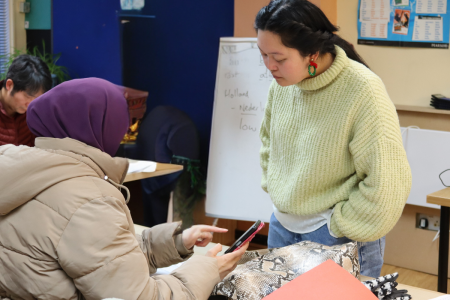
Rethinking Sustainability in Refugee and Migrant-Led Businesses: Diving into the Green Growth Accelerator Project
We are delighted to be one of the six organizations to play a leading role in shaping Bristol’s transition to a low-carbon and climate resilient city with the Community Climate Action Project. In parallel with this, ACH developed the Green Growth Accelerator Project in April 2023. Continue reading to understand how the project is creating a ripple in the sustainability wave across Bristol.
ACH is committed to assisting refugee and migrant-led (RML) businesses to be more environmentally sustainable and provide extensive business support towards achieving this. Since the commencement of The Migrant Business Support Project, 659** third-country nationals have received support in Birmingham and Bristol from 2021. They have received support through the delivery of business workshops, as well as follow-up support to explore business ideas, launch business start-ups, or transform an existing business and sustain it.
Building on the Migrant Business Support Project, the Green Growth Accelerator Project provides business support to encourage refugees and migrant-led (RML) businesses to be more sustainable. The aim of the project is to get more businesses to think sustainably, and ACH is providing these businesses with one-to-one bespoke support, looking for avenues and markets for them to participate in, which are more green-focused. The RML businesses are encouraged to undertake sustainable practices and formulate business plans which would help to curb costs and adopt energy-efficient practices. The project currently supports about 10 RML businesses every month. They recently had a workshop with the University of West of England (UWE) on the United Nations Sustainable Development Goals and how embedding these goals into their businesses could be beneficial for entrepreneurs and support them in driving a social impact whilst increasing their business revenue.
As per the findings on the carbon footprint report, produced by a Bristol charity, the Centre for Sustainable Energy, we discovered that refugees and migrants had a lower carbon footprint than their local Bristolian counterparts by around 60%. Ironically, they are the ones suffering the most from climate change, often residing in areas where air pollution is significantly more prevalent. Consequently, it would be unfair to exclude these communities from the green conversation.
More companies are switching to sustainable business practices and the market is transitioning towards a green economy. ACH is striving for refugee and migrant-led businesses to get their voices heard and believes their inclusion will have significant positive impacts to meet the carbon neutral and climate resilient goals laid out in the Bristol One City Climate Strategy.
Arguments for refugee and migrant involvement in net zero conversations:
Socioeconomic Integration: Low-carbon economies have the potential to create new opportunities for employment and develop new industries, consequently requiring new skill sets. Conversations involving refugees and migrants in these strategies must be had to ensure that their voices are heard. This inclusion can result in socioeconomic integration that factors in skills, employability, and green job access.
Diverse Knowledge and Perspectives: Refugees and migrants bring diverse knowledge, experiences, and perspectives to the table. Based on their individual experiences, they would have insightful observations and original ideas for addressing climate change and promoting sustainable development. Their inclusion enriches the discussion and produces stronger, more lasting solutions.
Global perspective: Global collaboration and understanding are needed to address the global challenge of climate change. Migrants frequently come from areas that have been severely damaged by climate change. These environmental or “climate migrants” are displaced from their homes becoming victims of global warming. The floods in Bangladesh and the droughts in Ethiopia are examples of this which have displaced millions of people and affected millions more. After facing these calamities, they can shed light on the difficulties posed by the issue in their home nations. Participating in net-zero discussions with them promotes international collaboration and solidarity in solving climate change.
If you, or someone you know, are looking for business support in Bristol or want to explore sustainable business development through the Green Growth Accelerator Project, get in touch with our Business Support Team: Business.support@ach.org.uk
Note: This blog post was written by Lordwin Jacob who is a Post Graduate student at Aston University.
** 659 service users have received support from January 2021 to the date of publication. The Migrant Business Support Project will run until December 2023.


